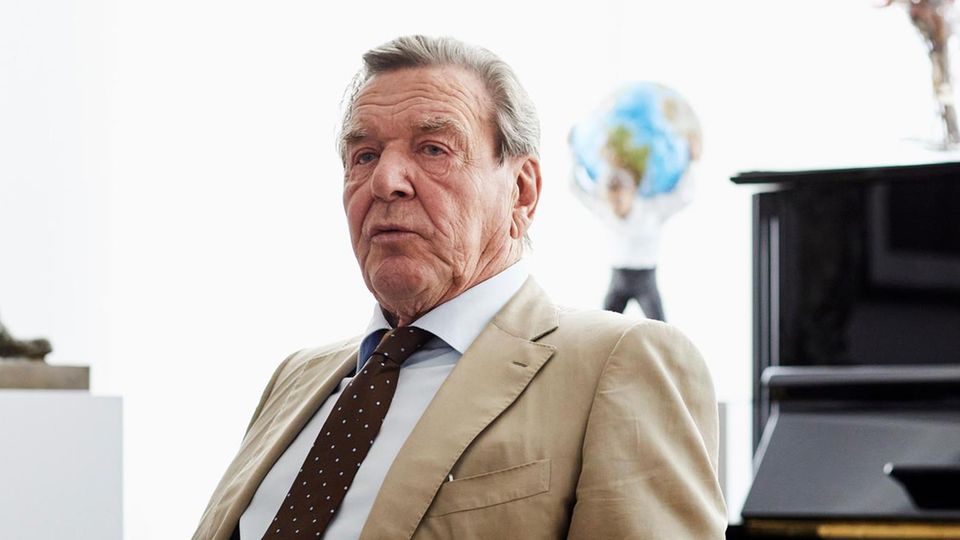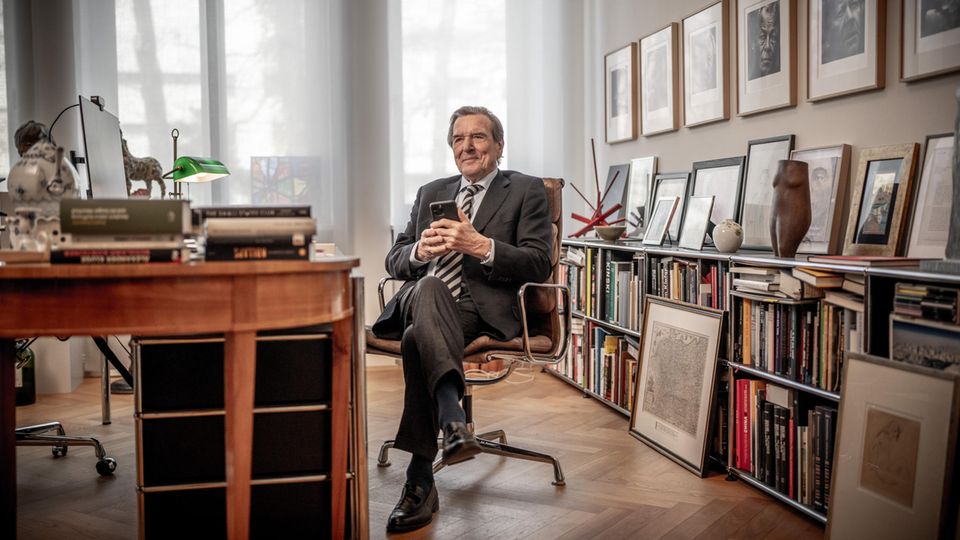This Sunday Gerhard Schröder turns 80. In keeping with this, ARD is showing its documentary about a man who has perfected the vice of lack of insight.
The sky is blue and white over the park area of the golf course near Hanover. The flags gently fluttering on high poles are evidence of a pleasant summer wind. A dark VW bus drives up and the only living former chancellor of the Federal Republic of Germany steps out. He is in the 80th year of his life and appears extremely agile. The hair is full, the face is tanned, the smile is wide.
“Hello,” says Gerhard Schröder. “Hello, Mr. Schröder,” replies the reporter and greets wife number three. “Hello, Ms. Schröder-Kim.” Best atmosphere in the resort.
This is how the one-hour film “Out of Service? The Gerhard Schröder Story” begins. The reporter, his name is Lucas Stratmann, followed the man who ruled Germany from 1998 to 2005 for several months. The result is a well-worth seeing portrait of someone who is notoriously unreasonable.
Gerhard Schröder, a former ruler in Putin’s service
Oh yes, “these arguments,” says Schröder on the bright green of the golf course. “They have to do with the war that is being waged there – and which I have publicly rejected.” The former chancellor’s left, white-gloved hand makes a contemptuous gesture. “But no one wants to know!” Well, whatever.
The war that Schröder is talking about, or more precisely: the war of aggression against Ukraine, has finally alienated him from his SPD – and from the rest of the Federal Republic at the same time. Many people resented the fact that he worked for the Russian state-owned company Gazprom after the end of his term in office. But the fact that he stuck to his male friendship with Vladimir Putin after the Russian annexation of Crimea and ultimately even after the invasion of Ukraine: This stupendous stubbornness has made him a pariah in large parts of society. The SPD wanted to exclude him and the Bundestag wanted to cut his office funding, but neither of these things worked really well.
Schröder doesn’t contest any of this anyway. Reporter Stratmann asks whether he felt the debate was unfair. “At least that, of course,” replies Schröder, who is now sitting in his sophisticated office in an obviously expensive suit. Another dismissive gesture follows. “But well, that’s how it is.” He has already had to endure so many injustices.
Realpolitik elder statesman, that’s how he wants to see himself
Schröder, what else, sees himself as a victim. At least he is still as arrogant and casual as he was when he resided in the Berlin Chancellery. Nevertheless, as the film also shows very clearly, it naturally works within him. The SPD, he says at one point, should not worry about its membership, but rather the fact that it is behind the AfD in the polls.
Otherwise, Schröder paints the picture of himself as a realpolitik elder statesmen, a Henry Kissinger from Hanover. That’s why he can’t do anything with the Green Foreign Minister’s so-called values-based agenda. The fact that Annalena Baerbock described Chinese President Xi Jinping as a dictator is simply “superfluous” for him. “I think it’s an extraordinary undesirable development that the foreign policy porcelain that is being shattered,” he says.
Gerhard Schröder (SPD), Federal Chancellor from 1998 to 2005, taken in his office.
© Michael Kappeler / dpa
The film hardly reveals anything new. But he once again explains very impressively why the man is a political alpha animal and won elections. Because Schröder still manages to sell his slightly oily old-boy paternalism as charisma. Even the jovial you-can-me attitude seems almost likeable at times.
First the economy, then morals
A longer section of the film shows Schröder’s failed attempt to mediate between Russia and Ukraine immediately after the outbreak of war in negotiations in Istanbul and in talks with Putin in Moscow. “Did you ask why he started this in the first place…?” asks the reporter. The former chancellor laughs at so much alleged naivety. “Well, listen, we’re not making a fairy tale here! If I, if I, so to speak, if I… like that, you don’t have negotiations on that level! It’s not, so sorry: it’s not about one “It’s a moral question. It’s about ending a conflict. It’s no use at all if you start moralizing.”
First comes the economy, then morals: This remains the credo of Schröder, who was called “comrade of the bosses” during his time in power. That’s why, as he liked to do during his time in office, he is of course flying to China in his old age, only this time it is not the German taxpayers who are paying for it, but rather some Chinese companies that he visits, but to which, as he emphasizes, he belongs , otherwise I have “no relationships”.
The journey from hotel to company and company to hotel sometimes has tragicomic features, for example when the socialist youth waves red flags for the guest of honor or the wife is once again busy taking photos of her former chancellor husband on her cell phone or giving him the lint from his suit wag.
What drives Schröder? It seems as if he still functions as he did when he shook the gate of the Chancellery in Bonn: He, who, as he once said, grew up as an “anti-social” in poor conditions, still wants to show everyone. He is the untamed unruly one. “I have lived with criticism all my life in politics and will continue to do so,” he says. “And if anyone thinks they have to rub themselves, God, then they should do it.”
Off-duty? The Gerhard Schröder story. April 8, 2024, ARD, 9 p.m



